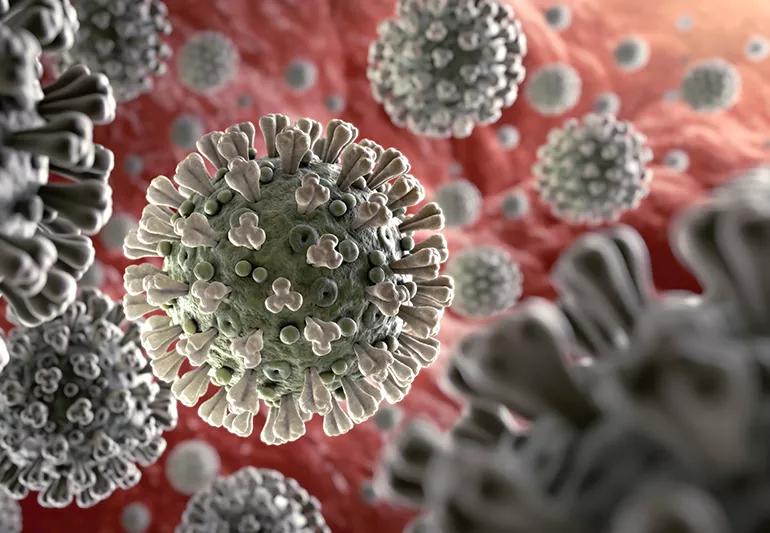Advertisement
Plus, the best ways to protect yourself

This article was originally published on Feb. 5, 2020. It was updated on June 30, 2020, to reflect new information about this rapidly evolving situation.
Advertisement
Cleveland Clinic is a non-profit academic medical center. Advertising on our site helps support our mission. We do not endorse non-Cleveland Clinic products or services. Policy
In recent months, a new coronavirus disease called COVID-19 has spread from where it was first detected in China to every continent except Antarctica. The U.S. has the highest number of cases, with nearly 2.6 million people infected and more than 128,000 deaths.
As new details emerge daily, you probably continue to wonder what this means for you, your family and your community.
There is still much to learn about this new coronavirus disease. The U.S. Centers for Disease Control says that “the immune response to COVID-19 is not yet understood.” Because this is a new strain of coronavirus, scientists continue collecting information and research on the virus.
As the situation continues to evolve, infectious disease specialist Frank Esper, MD, encourages people to stay informed and follow common-sense practices like proper hand-washing, social distancing and wearing cloth face masks in public to reduce the spread of viruses.
“This virus warrants our attention because it can cause very severe disease — but in 80% of people who get it, it does not,” he says.
Coronavirus is a family of viruses that are common in people and animals. They can cause a variety of illnesses, ranging from the common cold to severe pneumonia.
Coronaviruses spread from person to person through droplets released when people who are infected cough or sneeze. These infected droplets can land on people nearby, who can then become infected if the virus gets into their body through their eyes, nose or mouth.
So you could get COVID-19 from coming in close contact with an infected person who is coughing and sneezing, says Steven Gordon, MD, Chairman of the Department of Infectious Disease. That’s why the CDC recommends that you wear a cloth face mask in public to prevent the spread. Experts also suspect it may be possible to get it from touching a surface that has been contaminated with virus-containing droplets and then touching your eyes, nose or mouth.
Symptoms may appear two to 14 days after someone is exposed to the virus and are what one would expect from a typical upper respiratory infection:
“Unfortunately there is no truly identifying feature of this coronavirus that separates it from other viruses out there,” Dr. Esper says.
Other symptoms such as COVID toes and rashes have also been reported.
Most people who contract the virus will have mild symptoms and can recover on their own at home. But certain groups are at higher risk for serious illness, including:
Advertisement
Children have symptoms similar to adults, but typically their illness is mild.
The only way to confirm that someone has COVID-19 is through a swab test. Efforts are underway to make testing more widely available in U.S. hospitals and healthcare facilities. Because of this, Dr. Esper expects to continue seeing an uptick in the number of cases of COVID-19 being diagnosed and reported.
People infected with this virus should receive supportive care such as rest, fluids and fever control, to help relieve symptoms. For severe cases, treatment should include care to support vital organ functions — and the FDA also granted an emergency use authorization for the investigational antiviral drug remdesivir for patients who are hospitalized with COVID-19.
But the best way to protect against it and any other upper respiratory infection is to practice good cold and flu season hygiene, Dr. Gordon says.
Actions to prevent the spread of viruses include:
If you think you may have been infected with the coronavirus, call your healthcare provider. They will ask about your symptoms and recommend what next steps you should take.
Advertisement
Learn more about our editorial process.
Advertisement

Keep the area clean and monitor your incision site for discharge, odor or a change in appearance

The medication is ineffective and — in the case of animal ivermectin — potentially dangerous

Updated vaccinations are recommended to better protect against the evolving virus

Enteroviruses are often to blame for summer colds, leading to a runny nose, sore throat and digestive symptoms

Redness, swelling, itching and rash can happen when your body’s immune system reacts to the vaccine injection

Studies suggest 1 in 5 people infected with the coronavirus never develop symptoms

An increased risk of blood clots can last for nearly a year after a COVID-19 diagnosis

COVID-19 may be associated with tinnitus, but research is still ongoing

Focus on your body’s metabolic set point by eating healthy foods, making exercise a part of your routine and reducing stress

PFAS chemicals may make life easier — but they aren’t always so easy on the human body

While there’s little risk in trying this hair care treatment, there isn’t much science to back up the claims